|
The Korean government has been concentrating on establishing online government services since 1987 when it enacted laws expanding the supply of desktops and promoting the use of computer networks in order to more conveniently provide high-quality government services to its citizens. Thanks to such ongoing efforts to develop related technologies, Korea’s e-government systems are now receiving praise from around the world.
We would like to trace this journey from its initial footsteps through to some of today's most successful cases, and take a look at future directions in which the Korean government's online services and international cooperation are likely to go. This is the fifth part in a series about the Korean government sharing its e-government systems with the world. Today we cover the Korean government’s online procurement systems. |
Public procurement is one of the most important roles performed by a government. It determines the supplies purchased by government organizations and the contracts for facilities and amenities to be constructed by the public sector.
Since its establishment in 2002, the Korean government's Public Procurement Service (PPS) has been managing an online public procurement system, the Korea Online E-procurement System (KONEPS), also known as “Nara Jangteo” (나라 장터), in order to deal with public sector procurements in a digitalized manner. The KONEPS is the national public e-procurement system that processes the entire procurement cycle online, from tender notice and bidding through to contracting and payment. All public entities publish tender notices through KONEPS, and suppliers may participate in all public sector biddings after a one-time registration with the KONEPS, except for procurement projects in the defense sector.
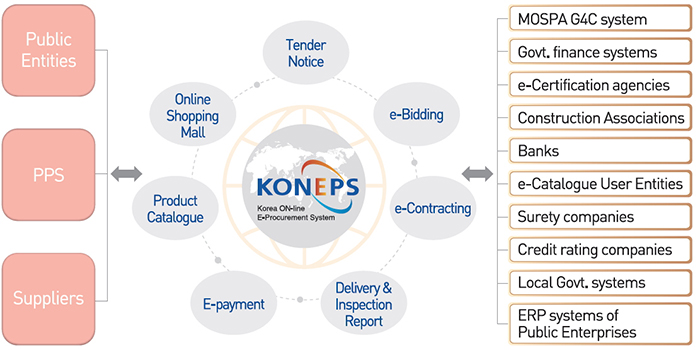
KONEPS is Korea’s national public e-procurement system that processes the whole procurement cycle online. The system covers tender notices, bidding, contracting and online payment.
KONEPS is the single window of the e-procurement system for the public sector that provides real-time information about online biddings for all government organizations. All registered firms can take part in biddings from any organizations without having to repeat the same procedures. KONEPS opens all procurement procedures in real-time in order to boost transparency. This is a cost-efficient system as it does not require too much paper work, such as bidding documents. It also boosts efficiency as it standardized procurement tasks in the public sector and interacts with data owned by public organizations.
A growing number of firms and public organizations use KONEPS. According to procurement authorities, in 2015 about 50,000 public entities and 320,000 firms registered with KONEPS. The accumulated transactions through KONEPS amounted to KRW 74.56 trillion. This means KONEPS made more than 60 percent of Korea's total public procurements of KRW 119 trillion, the largest single cyber transaction market in the world. In 2014, approximately 48,000 public organizations and 290,000 firms registered with KONEPS, which recorded KRW 67.32 trillion worth of accumulated transactions. In 2008, accumulated KONEPS transactions stood at KRW 63.15 trillion, with 39,000 public organizations and 150,000 firms.
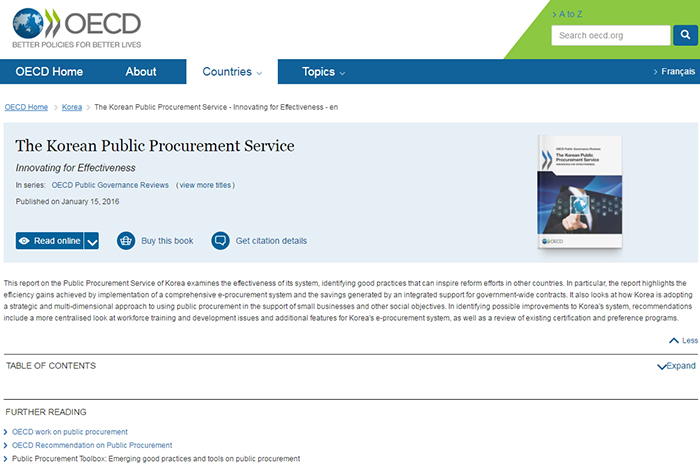
KONEPS received international recognition for its ‘best practices’ from international organizations such the U.N. and the OECD. The OECD and the PPS also jointly published a report on innovative cases in public procurement in March 2016.
Korea’s e-procurement system is highly respected around the globe. In 2003, KONEPS received a U.N. Public Service Award. The next year, the U.N. praised KONEPS for being one of the “best-practice models for e-procurement” in the category of reform of procurement operations.
The OECD also praised KONEPS in 2004, saying “no further action required.” The OECD and the PPS also jointly published a report titled “The Korean Public Procurement Service: Innovating for Effectiveness” in March 2016.
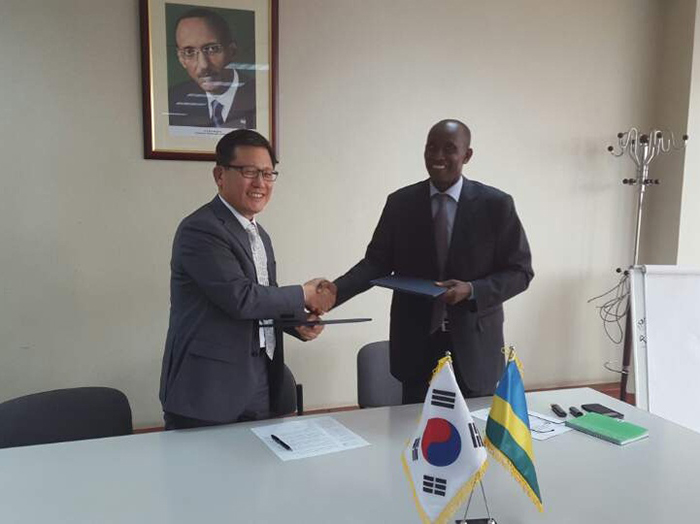
Vice-administrator of the PPS Lee Taewon (left) and Augustus Seminega, the director-general of Rwanda's Public Procurement Authority, pose for a photo after signing an MOU on e-procurement cooperation between Korea and Rwanda. As of November 2016, the online procurement system used by the Korean government has been exported to seven countries.
The world’s attention on Korea’s e-procurement system has led to many overseas exports. As of November 2016, the online procurement system used by the Korean government has been exported to seven countries. KONEPS was exported to Vietnam in 2008, which was worth about USD 1.78 million, to Costa Rica in 2009, worth around USD 0.31 million, to Mongolia in 2010 (USD 4.16 million), to Tunisia in 2011 (USD 5.7 million), to Cameroon in 2013 (USD 1.1 million), to Rwanda (USD 5.07 million) and to Jordan in 2015 (USD 8.5 million).
Among those, Costa Rica’s online procurement system, Mer-link, was awarded the ExcelGov Award from the Network of e-Government Leaders of Latin America and the Caribbean in 2012. In Tunisia, TUNEPS, the local version of KONEPS, was recognized as a Regional Champion in the Open Government Partnership 2015 program.
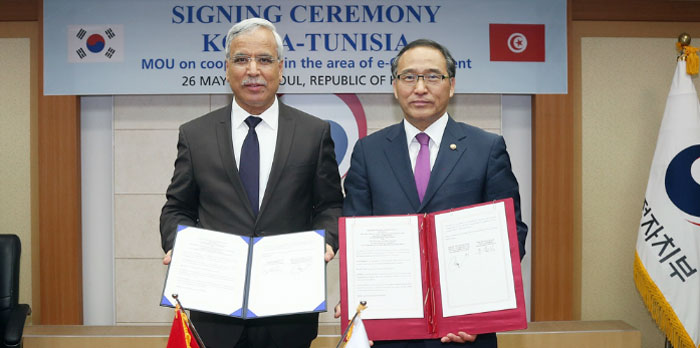
Kamal Ayadi, the Tunisian minister for public function, good governance and anti-corruption (left) and Minister of the Interior Hong Yun-sik pose for a photo after signing an MOU on e-government cooperation between Korea and Tunisia in May 2016. The Tunisian government asked the Korean government to cooperate on e-government services and to work together on the establishment of an e-procurement system in Tunisia.
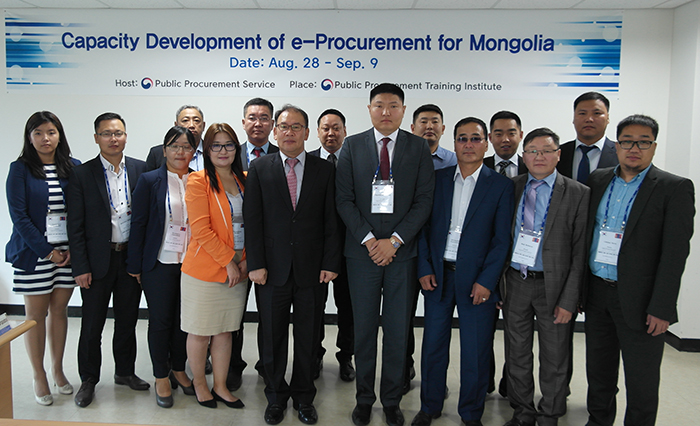
Korea has been sharing its expertise and experiences with its neighbors around the world. Mongolian public officers in the public procurement sector participate in a training program on e-procurement. The program was held at the Public Procurement Training Institute in Gimcheon, Gyeongsangbuk-do Province, in August 2016.
The world’s interest in the Korean government's e-procurement systems is spreading around the globe, including to African countries such as Ethiopia and Uganda, to countries in Central and South America and to Asia. The Ethiopian government asked for the PPS to conduct a feasibility test for the introduction of KONEPS there in March 2015. In the case of Tunisia, the Tunisian government hoped to expand cooperation on e-government services with Korea after the joint establishment of an e-procurement system with Korea. The two countries signed an MOU on e-government cooperation in May 2016.
Korea has been actively sharing its experiences and knowhow with its partners around the world. According to procurement authorities, about 30 countries and around 200 procurement officials have visited Korea to take part in e-procurement education programs. In 2016 alone, as of November, a total of 286 officials from 79 countries, including Uganda, Mongolia, Botswana and Afghanistan, have come to Korea for e-procurement training programs.
By Yoon Sojung
Korea.net Staff Writer
Photos: PPS, Ministry of the Interior
arete@korea.kr